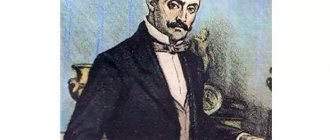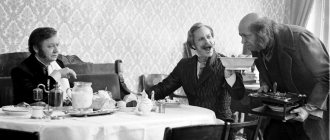- Essays
- Literature
- Gogol
/
/
Pavel Ivanovich Chichikov completes the chain of his visits to acquire dead souls with a visit to Plyushkin. He counted on great luck on his estate, and his hopes were fully justified. Over the course of several years, this landowner had more than 120 serfs die, and more than 80 runaways. Chichikov bought them all for 30 kopecks per head and was very pleased with the result of the trip.
Both Chichikov and all the landowners he met on the way to dubious transactions live by the idea of enrichment. Gogol showed various degrees of obsession with this idea in the images of landowners.
The last stage of absorption by the passion for profit is embodied by Plyushkin. At this stage, a person does not even have a spark of goodness left, and, deprived of the spiritual principle, he turns into a phantom, ghost, dead soul.
The figure of Plyushkin, the only one depicted in Gogol’s poem “Dead Souls,” acts as an ominous warning: be afraid of turning into Plyushkin, because this is the embodied destruction of all living connections with the world and people. Plyushkins sow savagery and death.
The landowner's village is made up of dilapidated houses, their cracked, cracked walls resemble bare ribs, and the windows have rags instead of glass. All the windows in the manor's house are boarded up, except two.
Being the owner of thousands of serf souls, Plyushkin turns all their labor into dust. The grain rots in the treasures, the canvases and cloth cannot be touched - they fall into shreds. The owner's greed drove away all the buyers. What the peasants produce becomes manure. They themselves die of hunger and disease or go on the run. The names of dead people on the paper seemed to Chichikov like midges dotting the white sheet.
Plyushkin’s pile of rubbish in the corner of the room, all covered with the dust of decades, became a symbol of senseless stinginess and greed. It testifies to what “nastiness and meanness” a person could reach, indifferent not only to the fate of the peasants, but also to the fate of his children: the elders ran away (the son joined the regiment, the daughter married the captain), the youngest daughter died. Even earlier, my wife left this world.
Left alone, Plyushkin does not feel any regrets because of the emptiness that surrounds him, and, like a spider, he scurries around in the web of his crumbling economy and life that has lost its human features. He even lost the external signs of gender. Chichikov doubted for a long time whether it was a woman or a man in front of him, and then decided that it was the housekeeper. The bunch of keys on Plyushkin’s belt is another symbol of false values, to the service of which this hero sold his life and soul.
In the episode of Chichikov’s meeting with Plyushkin, the author showed the absurdity of hoarding for the sake of naked enrichment, which is not intended to bring benefit to anyone.
Other topics: ← Wow Vakula, what a great fellow ↑ GogolMorals and customs of the district town N →
`
Popular writings
- Essay Self-confidence
What distinguishes a self-confident person from an insecure one? - Essay by Nikolai Nikolaevich in the story The Garnet Bracelet (image and characteristics)
Nikolai Nikolaevich Mirza-Bulat-Tuganovsky is the brother of Vera and Anna, a minor character in the story The Garnet Bracelet by A.I. Kuprin. - Essay on the painting Silence by Levitan, grade 4
Isaac Levitan’s painting “Silence” is a work of the artist’s late period. It is not as famous as his other works. But that doesn’t make it any less interesting and beautiful.
Analysis of the episode “Chichikov at Plyushkin’s” (based on N.V. Gogol’s poem “Dead Souls”)
The poem “Dead Souls” is the most significant work of N.V. Gogol, the pinnacle of his creativity and a qualitatively new phenomenon in Russian literature. Herzen called this work “a cry of horror and shame,” because, creating a whole gallery of images of landowners and city officials, Gogol considers them “dead souls” who have lost their human face and the ability to truly see, hear, and think. By resorting to the technique of exaggeration or sharpening of individual, most characteristic human features, Gogol deeply and vividly reveals the inner essence of his characters.
Gogol depicted the terrible degradation of man using the example of Plyushkin, upon entering whose village Chichikov noticed “some kind of special disrepair”: the roofs of the peasant huts were like a sieve, the windows in them were without glass and covered with rags, the logs from which the houses were built were rotted and blackened from time. Huge treasures of grain collected long ago were overgrown with grass and bushes. The master’s house, which looked “like some kind of decrepit invalid,” presented an equally tragic sight. Only the old garden, decayed and wild, refreshed this picture, since only life was felt in it.
When he first saw Plyushkin, Chichikov did not immediately recognize him as the owner, he was dressed so shabbyly. From this figure that had lost its human appearance, it was impossible to determine whether it was a man or a woman, much less recognize in her the richest landowner with more than a thousand souls of serfs and storerooms that were bursting with accumulated goods. The appearance of the owner is very unpleasant, but even more disgusting is the life he leads. In his warehouses and barns, his bread, vegetables, leather rots and rots, and he still walks the streets of his village every day, collecting all sorts of rubbish from his serfs in the corners: old soles, rags, nails, shards, and drags it all to to his room, which is why everything in his house was dilapidated, dirty, and wretched. Having lost touch with time, with reality, Plyushkin does not understand the value of things and keeps a piece of sealing wax, “a glass with some liquid and three flies,” candle stubs, scraps of paper, toothpicks, feathers, dried lemon as the greatest treasures...
But Plyushkin was not always like this: “...there was a time when he was just a thrifty owner! he was married and a family man, and his neighbor came to him for lunch, to listen and learn from him about farming and wise stinginess...” When his wife died, the landowner “became more restless... more suspicious... stingier...” Now the once rich estate has turned into a collapsed farm, friends and acquaintances the landowner dispersed, began to look at the children as if they were parasites, and got rid of them, driving them out of the house, even his own soul resembles a dusty, rotting heap in the corner of the room. This pitiful semblance of a person does not evoke any sympathy in our hearts, but only disgust and a feeling of disgust. Material from the site //iEssay.ru
Gogol sees the origins of Plyushkin’s tragedy in the constant poverty and stinginess of his feelings, because it is not without reason that even at the time of prosperity of his farm and family, the writer compares this landowner with a hardworking spider. Now all that remains for him is quarrels and squabbles with the servants, in which he often sees thieves and swindlers, and pathetic beggaring. It is also not surprising that such a master’s serfs either died like flies or fled wherever they looked. Chichikov himself was honored with Plyushkin’s kind words only because, having immediately assessed the situation, he showed himself to be a benefactor, willing to bear the costs of all the dead and runaway peasants.
Thus, Gogol not only confronts us with fragments of Plyushkin’s life: when “everything flowed alive” and when he turned into “a hole in humanity.” In search of the origins of the impoverishment of the soul and the process of internal devastation, the brilliant writer vividly and eloquently depicts the destructiveness of the serfdom and the terrifying consequences that it brings to society as a whole and to its individual representatives in particular.
Didn't find what you were looking for? Use search ↑↑↑
On this page there is material on the following topics:
- watch the episode of Chichikov at Plyushkin's
- landowner Plyushkin, who has lost his human appearance
- why does his bread rot and rot in his warehouses and barns?
- brief analysis of Chichikov and Plyushkin
- Chichikov's lesson at Plyushkin's episode analysis
↑ Plyushkin, his “souls” and Chichikov.
Chichikov's proposal to pay taxes for the dead peasants completely amazed Plyushkin; he was even speechless with joy. But the joy on his “wooden face” disappeared instantly: he became preoccupied with how to do this, and began to sigh again about the costs associated with the registration of the deed of sale. Hearing that Chichikov was taking it upon himself, Plyushkin thought that he served as an officer because, in his opinion, they were stupid. He had this long-standing and ineradicable conviction: he considered all military men to be “gamblers and money-makers”; Plyushkin did not trust his neighbor-captain, who was among his relatives; to his officer-in-law: he is only “a master at stamping a spur.”
Plyushkin suspects all his servants of theft; the features of Chichikov’s “generosity” also began to seem incredible to him, and he, to Chichikov’s joy, hastened with the deal. “After all, the devil knows, maybe he’s just a braggart, like all these little money-makers; he’ll lie, he’ll lie to talk and drink tea, and then he’ll leave!” - thought Plyushkin
Out of pleasure that the sale was going so well, Plyushkin decided to treat Chichikov to a “liqueur”, in which there were “boogers and all sorts of rubbish ... stuffed,” but the owner took out the rubbish and now it is fit for consumption. Chichikov's refusal brought Plyushkin into an even more blissful mood. “We already drank and ate! - said Plyushkin. - Yes, of course, you can recognize a person’s good company anywhere: he doesn’t eat, but is well-fed; and like some kind of thief, no matter how much you feed him... After all, the captain will come: “Uncle, he says, give him something to eat!” And I’m as much an uncle to him as he is a grandfather to me.”
To finalize the deal, a trusted person in the city was required, because Plyushkin was afraid to leave the house - “the people are either a thief or a swindler.” It turned out that the chairman of the chamber himself was his “one-taker” (“they climbed fences together”), and on this wooden face “some kind of warm ray suddenly slid, it was not a feeling that was expressed, but some kind of pale reflection of a feeling, a phenomenon similar to the unexpected the appearance of a drowning person on the surface of the waters. <...> But in vain the overjoyed brothers and sisters throw a rope from the shore and wait to see if a back or arms tired from the struggle will flash again - this was the last appearance. Everything is silent, and after that the quiet surface of the unresponsive element becomes even more terrible and deserted. So Plyushkin’s face, following the feeling that instantly slid across it, became even more insensitive and even more vulgar.”
Chichikov watches how Plyushkin manages the housework and corrosively reproaches his servants Proshka and Mavra for theft: he is sure that Proshka can steal something from the pantry, and Mavra can “tip” a piece of paper, and intimidates the maid (“...at the Last Judgment the devils will beat you up with iron slingshots for this."
Chichikov's visit to Plyushkin
Chichikov Pavel Ivanovich visited Plyushkin last after Sobakevich. Then the hero-entrepreneur went to the city and in his tavern drew up deeds of sale for all the purchased peasants. Thus, in “Chichikov’s businessman” this episode is the culmination. The hero has achieved his goal. The revelation will follow later.
In the gallery of portraits of “dead souls,” the image of Plyushkin is also the culmination, because everything negative is concentrated in him.
In the buying and selling scene, Plyushkin’s character is expressively revealed; The main feature of the hero is stinginess, brought to the point of absurdity, crossing all boundaries.
First of all, Plyushkin’s reaction to Chichikov’s proposal attracts attention. With joy, the landowner is speechless for a moment. Greed has so permeated his brain that he is afraid of missing out on the opportunity to get rich. Gogol uses an interesting metaphor: “the joy that so instantly appeared on his wooden face passed just as instantly... The metaphor “the wooden face defines the essence of Plyushkin. He had no normal human feelings left in his soul. Plyushkin is like a block of wood, he doesn’t love anyone, he doesn’t regret it at all. He can only experience something for a moment, in this case the joy of a good deal.
Soon the landowner's usual fear and concern return to him, because the deed of sale will entail some expenses. Plyushkin is unable to survive this.
The author emphasizes the discrepancy between the hero's words and his own behavior. The following comic situation arises: Plyushkin begins to be indignant at the greed of officials who take bribes: “The clerks are so unscrupulous! Before, it used to be that you would get away with half a piece of copper and a sack of flour, but now send a whole cart of cereals, and add a red piece of paper, such love of money! And the landowner himself is greedy to the last extreme. From the scene of buying and selling “dead souls” one can learn new examples of his stinginess. So, at Plyushkin’s for all the servants; for both young and old “there were only boots, which were supposed to be in the entryway. Or another example. The owner wants to treat Chichikov to a liqueur, which used to contain “boogers and all sorts of rubbish, and the liqueur was placed in a decanter, which “was covered in dust, like in a sweatshirt. The grotesque helps to evoke a feeling of disgust and condemnation towards Plyushkin.
The scene also shows Plyushkin's rudeness and suspicion. He scolds the servants. For example, he addresses Proshka: “Fool! Ehwa, fool! And the master calls Mavra “a robber.” Plyushkin suspects everyone of stealing: “After all, my people are either a thief or a swindler: they will steal so much in a day that there will be nothing to hang a caftan on. Plyushkin deliberately becomes poor in order to “snatch an extra penny from Chichikov. What is characteristic in this scene is that Plyushkin bargains with Chichikov for a long time. At the same time, his hands tremble and shake with greed, “like mercury. Gogol finds a very interesting comparison. We clearly understand that Plyushkin has lost his human appearance.
The author in this scene creates another bright comic situation. When we read the dialogue between Mavra and Plyushkin, we immediately notice a discrepancy. After all, the master accuses the servant of stealing a piece of paper. And for this little thing he threatens Mavra with the Last Judgment! When the housekeeper found the paper, Plyushkin had no choice but to accuse Mavra of another sin, of excessive wastefulness: “... you grab a tallow candle, lard is a hot matter: it will burn - yes and no, only a loss, and you bring me a splinter! There is also an author’s assessment of the character in this scene: “And to what insignificance, pettiness, nastyness a person could condescend! Could have changed so much! The writer calls on young people to preserve “all human movements in order to avoid degradation, so as not to turn into Plyushkin and others like him.
This episode revealed all his disgusting qualities in Plyushkin. The author calls the landowner “insensitive and vulgar. For him, he is “a strange phenomenon, an old man. The word “old man” uses a derogatory suffix because Gogol does not accept this hero’s lifestyle. He shows us his “numbness.” The second time the metaphor “wooden face” is found in the vivid comparison of Plyushkin with a drowning man. Stinginess has taken its place in the character’s heart, and there is no longer any hope of saving his soul.
Chichikov in the scene of buying and selling “dead souls” shows cunning, resourcefulness, hypocrisy, and greed. He deftly assured Plyushkin that he wanted to help him because of the old man’s kind soul. Chichikov bought dead and fugitive souls from the miser for next to nothing and took upon himself the costs of the deed of sale. The episode added an additional touch to the portrait of a cunning predator-acquirer.
Thus, the stage is important for the realization of the ideological concept of the entire work. The author poses the problem of human degradation. The image of Plyushkin completes the portrait gallery of landowners, each of whom is spiritually insignificant than the previous one. Plyushkin closes the circuit. He is a terrible example of moral and physical degeneration. The episode plays a big role in revealing the idea of the poem. The author shows that “dead souls such as Plyushkin, Chichikov and others are ruining Russia.


